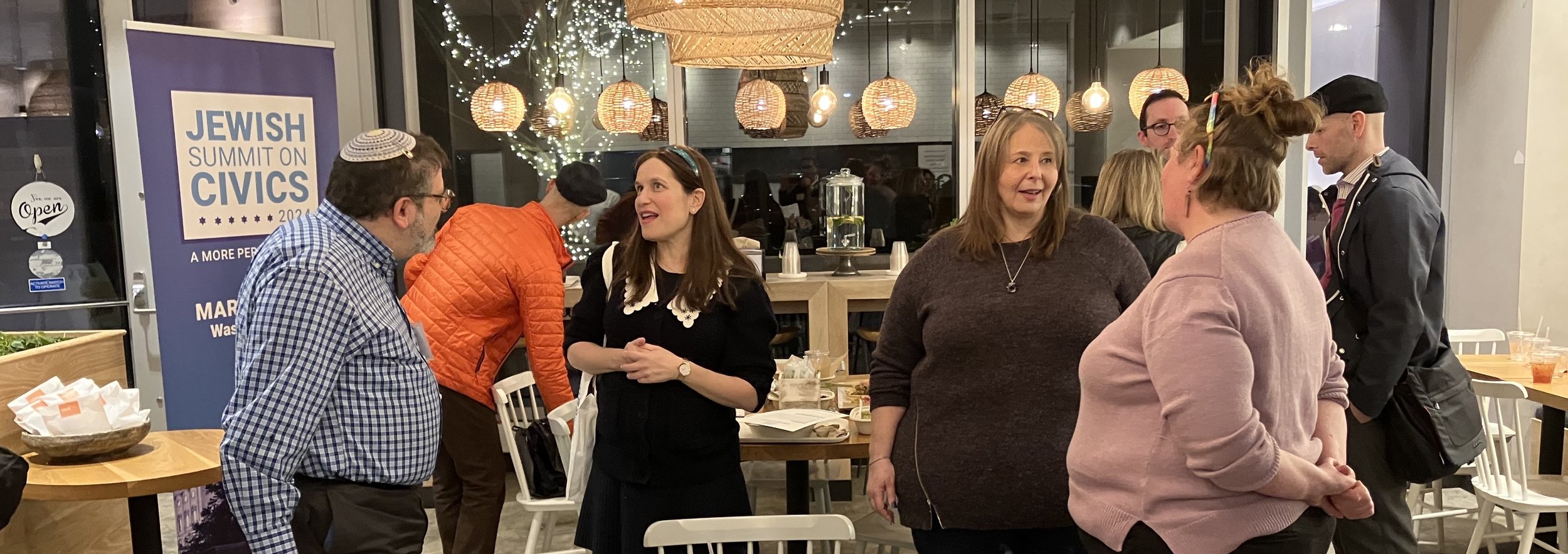More Civic Learning Starts Today
Representatives of Jewish organizations from across the United States gather in Washington, DC to attend the Jewish Summit on Civics, including the Civic Learning Week National Forum.
“Vote.” That’s the word we hear over and over again during election season.
There’s a reason we hear it so often, of course: voting is an essential feature of our democracy. It’s the most direct way we express our preferences for the future of our country. It’s both a literal and symbolic representation of our ability to govern ourselves.
And yet – there is much more to our democracy than the act of voting. To exercise our right to vote responsibly, we must be informed. We have to understand the options on the ballot; we have to be clear about our own ideological and political value; and we have to understand our state’s voting laws (many of which have changed since 2020). Voting is the action, but civic learning is the fuel that makes it possible.
So what is civic learning and why does it matter to the Jewish community? Broadly speaking, civic learning is the lifeline process of building the knowledge, skills, and dispositions that we need to be well-informed, productively engaged, and hopeful participants in civic and democratic life. Civic learning teaches us how our government works, the levers we have to pursue social change, and the responsibilities we have to one another.
Civic learning also forms the foundation on which all self-advocacy is built. Throughout American history, Jews have been avid students of American democracy and civic engagement, and our civic learning has powered effective communal action again and again. Indeed, Jews founded the ADL to fight antisemitism and bigotry following the 1912 murder of Leo Frank. The American Jewish community used our political system to great effect to convince Congress to act in defense of Soviet Jewry in the 1980s. And since October 7, members of our community have testified in front of Congress, lobbied the Department of Education, spoken at city council meetings, and gathered en masse on the National Mall to exercise their right to advocate for community priorities. None of this would be possible without robust communal opportunities for civic learning.
Nonetheless – in the Jewish community and in America writ large, we often fail to invest in or name meaningful civic learning opportunities for people of all ages. Indeed, civic education in public schools (where the vast majority of American Jewish young people are educated) is woefully underfunded; for every 50 dollars spent on STEM education in public schools, for example, we spend just five cents on civics. We have yet to find any publicly available statistics on investment in civics-related curriculum or activities in Jewish day schools or community settings. Is it any surprise that one in three 18-24 year old Americans report being “not very knowledgeable” about civics?
This matters, because as a society, we want the people who make choices about our future to have the information they need to make well-informed, well-reasoned judgments (voting and otherwise). We want people who run for office to be qualified and serious. We want people who serve on juries to be diligent and conscientious. We want people who consume news to confidently assess what is true and what is sensationalism, bias, or conspiracy.
The good news is there are many ways to bring meaningful civic learning into Jewish and secular spaces. In fact, this week marks the first-ever Jewish Summit on Civics, a three-day event designed to bring Jewish leaders from around the country into dialogue with the leading experts on civics education in America. The summit, put on by A More Perfect Union and run in conjunction with Civic Learning Week, aims to ensure faith communities have a seat at this table for the first time.
This is a critical new connection, not least because 72% of Americans – a staggering three in four – say they have no place or group with which to discuss civics. To this end, the summit reaches far beyond formal educational settings. Together, we are discussing what civic learning looks like – or could look like – in synagogues, summer camps, in youth groups, social service settings, and in advocacy efforts. We’ve also produced a compendium of innovative ideas and approaches to civic learning in Jewish spaces, sourced from our nationwide network of Jewish institutions, including innovative leaders like Civic Spirit and Facing History and Ourselves.
Of course, we don’t imagine that our summit alone will provide the answer for civic learning in Jewish contexts. But we do hope it will offer a step forward; that we’ll generate new ideas for our community, and inspiration to others. We hope that we can encourage more members and institutions in our community – and in other faith communities – to see the value of civic learning and the better future that we can help build if we do our part. We hope to help train new Jewish leaders, each of whom is fully-equipped to advocate for our collective interests in the public square.
It’s clear that there are opportunities here for action. But action fueled by knowledge? That’s what America – and the American Jewish community – needs.
Have we piqued your interest? If your organization is interested in working with us to expand opportunities for civic learning in the Jewish community, please check out our page on joining the Jewish Partnership for Democracy. There is no financial requirement to join this network — just a commitment to action!

